| Home > China Feature |
Chinese haircuts
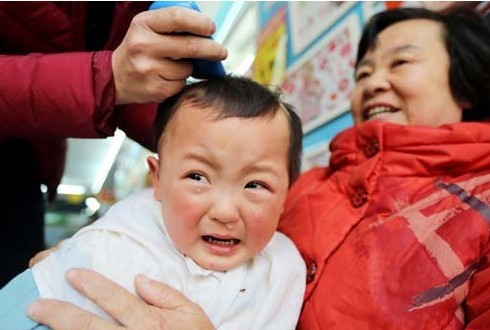
A boy has a haircut in Huaibei, Anhui province, on Wednesday. Many Chinese follow tradition and get a haircut on the second day of the second lunar month, called Longtaitou - which means " raising the dragon's head" - hoping it will bring good luck.
Barbershops enjoyed brisk trade on Wednesday, as it was a lucky day to get a haircut according to Chinese tradition.
Longtaitou, the day "raising the dragon's head", falls on the second day of the second lunar month and signals that spring is in full swing.
Wu Xiumin, from Silian Hair Salon, a Beijing chain established in the 1950s, said branches opened their door two hours earlier, as some customers had been waiting since 5 am.
At its flagship store in Wangfujing Street, the first customer left at 7:30 am, and by 3 pm more than 200 people had received haircuts.
Wu said 20 barbers began work at 7 am and were expected to stay on the job until 10 pm. After the long day, they expected to collect 20 km of hair on the floor, about four times the amount from a typical day.
Three-month-old Bao Zhenwei had his head shaved for the first time. His mother said they had come from eastern Tongzhou district and the family had waited to bring Bao for his first haircut on this special day in the hope he will be healthy and have a bright future.
Shan Liang, a branch manager at YesFashion Hair Salon, another chain in Beijing, said there was a sharp increase in customers compared with the past two weeks, but a record high was hit in 2012, with more than 300 people served in one day in his store.
"We opened the doors an hour early. The number of customers may easily exceed 200, while in the past two weeks we had less than 100 customers a day," Shan said.
People who observe Longtaitou usually follow a folk belief that says people should not have a haircut during the first lunar month otherwise, as legend goes, their maternal uncles will die.
Shan said that belief played a role in discouraging customers from visiting his store in past weeks.
The elderly are the most mindful of the occasion. At Hepingli, a neighborhood in Beijing's Chaoyang district, more than 100 people older than 60 got a free haircut on Wednesday.
Huang Sujiang, head of a neighborhood association serving the elderly, said the association invited residents to get a free haircut and found 30 barbers who agreed to donate their time.
"The elderly all left with a smile on their face. They not only had a haircut, but also met with doctors for health advice," Huang said.
Chen Zhuo, 36, from Shenyang, Liaoning province, planned to take her 7-year-old son to a barbershop on Wednesday, but in the end decided to cut his hair herself.
"I don't fully believe the tradition," she said. "My son had the haircut in previous years. But this year, it is less convenient to arrange because he has to go to school," Chen said.
Tang Yang, 28, a museum exhibition designer in Beijing, said in her native city of Linyi, Shandong province, people usually had their hair cut before the Lunar New Year, and avoided getting one in the first lunar month.
"Personally, I don't believe in this. I planned to go to a barbershop on Wednesday to trim my long hair, then I realized it will be extremely crowded. I will wait until next week, instead," Tang said.
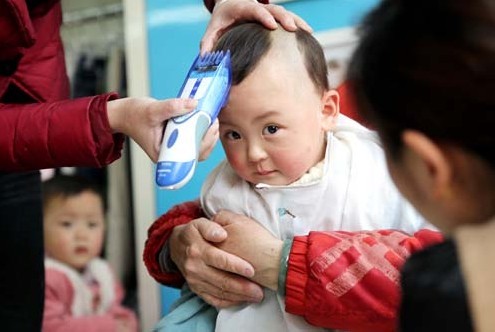
A boy has a haircut in Huaibei, Anhui province, on Wednesday. Many Chinese follow tradition and get a haircut on the second day of the second lunar month, called Longtaitou - which means " raising the dragon's head" - hoping it will bring good luck.
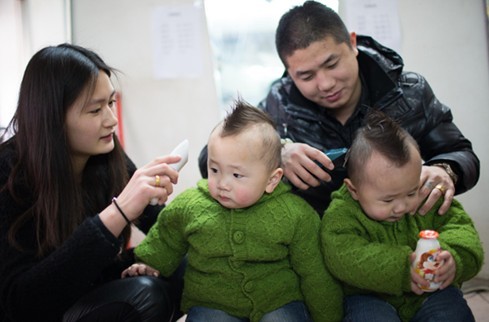
Twins get a haircut at a barbershop in Huaibei, Anhui province on March 13, 2013, which is the traditional Chinese festival Longtaitou (dragon head raising), which refers to the start of spring and farming. During the festival, held on the second day of the second month on the lunar calendar, people play dragon lanterns, eat noodles, get their hair cut, and pray for luck.
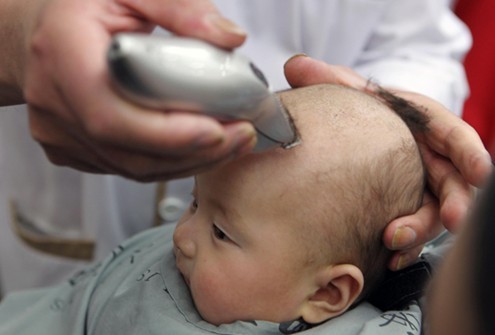
A child gets a haircut at a barbershop in Beijing on March 13, 2013. Many Chinese who follow tradition choose to have their hair cut on Feb 2 on the lunar calendar.
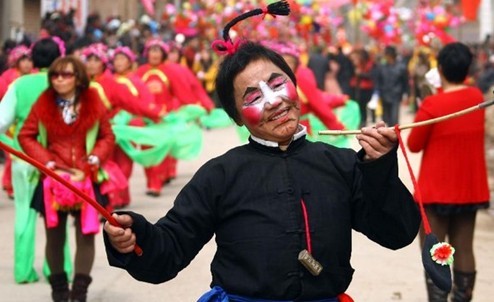
Villagers perform during a celebration for "Er Yue Er" in Yangxian Village of Ruicheng County in Yuncheng City, north China's Shanxi Province, March 13, 2013, on the occasion of the second day of the second lunar month, known in Chinese as Er Yue Er, "a time for the dragon to raise its head", as a Chinese saying goes. Various kinds of traditional activities were held all over the country to celebrate the festival to pray for a good harvest in the coming year.
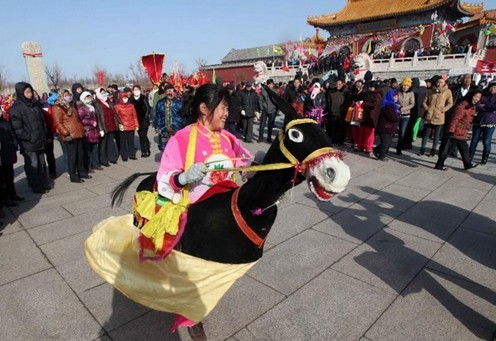
Folk artists perform during a ceremony in Weifang City, east China's Shandong Province, March 13, 2013, on the occasion of the second day of the second lunar month, known in Chinese as Er Yue Er, "a time for the dragon to raise its head", as a Chinese saying goes. Various kinds of traditional activities were held all over the country to celebrate the festival to pray for a good harvest in the coming year.
Art
 more
moreChina Beijing International Diet ...
Recently, The hit CCTV documentary, A Bite of China, shown at 10:40 ...
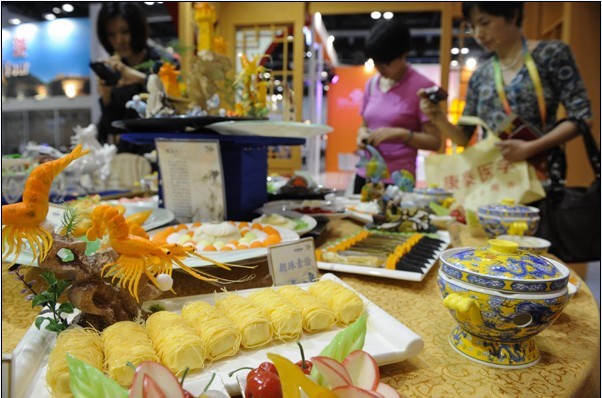
Exhibition of Ancient Chinese Jad...
At least 8,000 years ago, Chinese ancestors discovered a beautiful...
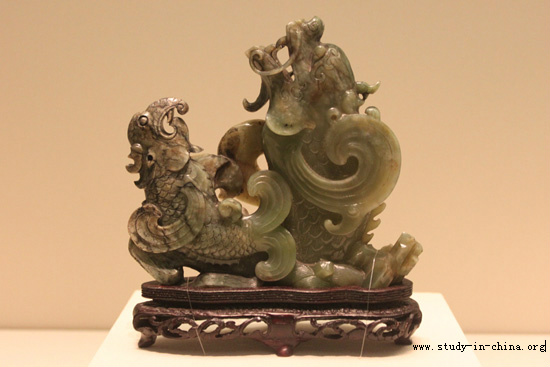
Longmen Grottoes
The Longmen Grottoes, located near Luoyang, Henan Province, are a tr...
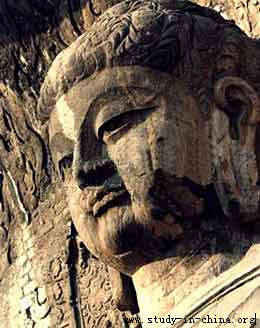
Custom
 more
moreWeb Dictionary
Martial Arts
Tai Chi Master Class Held in Moscow
MOSCOW, June 15, 2016 (Xinhua) -- Students learn from Shaolin ...
Celebriting 70 years' efforts in restoring Mogao...
Work is being carried out at the restoration site of cave No 98 a...
Hong Kong Children's Symphony performs in Seattle
Under the theme of Tribute to the Golden Age, a concert featuring a ...





 print
print  email
email  Favorite
Favorite  Transtlate
Transtlate 








